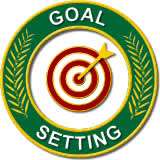
The Science of Setting Goals
 What happens in our heads when we set goals?
What happens in our heads when we set goals?
Apparently a lot more than you’d think. Goal setting isn’t quite so simple as deciding on the things you’d like to accomplish and working towards them.
According to the research of psychologists, neurologists, and other scientists, setting a goal invests ourselves into the target as if we’d already accomplished it. That is, by setting something as a goal, however small or large, however near or far in the future, a part of our brain believes that desired outcome is an essential part of who we are – setting up the conditions that drive us to work towards the goals to fulfill the brain’s self-image.
Apparently the brain cannot distinguish between things we want and things we have. Neurologically, then, our brains treat the failure to achieve our goal the same way as it treats the loss of a valued possession. And up until the moment the goal is achieved, we have failed to achieve it, setting up a constant tension that the brain seeks to resolve.
Ideally, this tension is resolved by driving us towards accomplishment. In many cases, though, the brain simply responds to the loss, causing us to feel fear, anxiety, even anguish, depending on the value of the as-yet-unattained goal.
Love, Loss, Dopamine, and Our Dreams
 The brains functions are carried out by a stew of chemicals called neurotransmitters. You’ve probably heard of serotonin, which plays a key role in our emotional life – most of the effective anti-depressant medications on the market are serotonin reuptake inhibitors, meaning they regulate serotonin levels in the brain leading to more stable moods.
The brains functions are carried out by a stew of chemicals called neurotransmitters. You’ve probably heard of serotonin, which plays a key role in our emotional life – most of the effective anti-depressant medications on the market are serotonin reuptake inhibitors, meaning they regulate serotonin levels in the brain leading to more stable moods.
Somewhat less well-known is another neurotransmitter, dopamine. Among other things, dopamine acts as a motivator, creating a sensation of pleasure when the brain is stimulated by achievement. Dopamine is also involved in maintaining attention – some forms of ADHD are linked to irregular responses to dopamine.
So dopamine plays a key role in keeping us focused on our goals and motivating us to attain them, rewarding our attention and achievement by elevating our mood. That is, we feel good when we work towards our goals.
Dopamine is related to wanting – to desire. The attainment of the object of our desire releases dopamine into our brains and we feel good. Conversely, the frustration of our desires starves us of dopamine, causing anxiety and fear.
One of the greatest of desires is romantic love – the long-lasting, “till death do us part” kind. It’s no surprise, then, that romantic love is sustained, at least in part, through the constant flow of dopamine released in the presence – real or imagined – of our true love. Loss of romantic love cuts off that supply of dopamine, which is why it feels like you’re dying – your brain responds by triggering all sorts of anxiety-related responses.
Herein lies obsession, as we go to ever-increasing lengths in search of that dopamine reward. Stalking specialists warn against any kind of contact with a stalker, positive or negative, because any response at all triggers that reward mechanism. If you let the phone ring 50 times and finally pick up on the 51st ring to tell your stalker off, your stalker gets his or her reward, and learns that all s/he has to do is wait for the phone to ring 51 times.

Romantic love isn’t the only kind of desire that can create this kind of dopamine addiction, though – as Captain Ahab knew well, any suitably important goal can become an obsession once the mind has established ownership.
The Neurology of Ownership
Ownership turns out to be about a lot more than just legal rights. When we own something, we invest a part of ourselves into it – it becomes an extension of ourselves.
In a famous experiment at Cornell University, researchers gave students school logo coffee mugs, and then offered to trade them chocolate bars for the mugs. Very few were willing to make the trade, no matter how much they professed to like chocolate. Big deal, right? Maybe they just really liked those mugs!
But when they reversed the experiment, handing out chocolate and then offering to trade mugs for the candy, they found that now, few students were all that interested in the mugs. Apparently the key thing about the mugs or the chocolate wasn’t whether students valued whatever they had in their possession, but simply that they had it in their possession.
This phenomenon is called the “endowment effect”. In a nutshell, the endowment effect occurs when we take ownership of an object (or idea, or person); in becoming “ours” it becomes integrated with our sense of identity, making us reluctant to part with it (losing it is seen as a loss, which triggers that dopamine shut-off I discussed above).
Interestingly, researchers have found that the endowment effect doesn’t require actual ownership or even possession to come into play. In fact, it’s enough to have a reasonable expectation of future possession for us to start thinking of something as a part of us – as jilted lovers, gambling losers, and 7-year olds denied a toy at the store have all experienced.
The Upshot for Goal-Setters
So what does all this mean for would-be achievers?
On one hand, it’s a warning against setting unreasonable goals. The bigger the potential for positive growth a goal has, the more anxiety and stress your brain is going to create around it’s non-achievement.
It also suggests that the common wisdom to limit your goals to a small number of reasonable, attainable objectives is good advice. The more goals you have, the more ends your brain thinks it “owns” and therefore the more grief and fear the absence of those ends is going to cause you.
On a more positive note, the fact that the brain rewards our attentiveness by releasing dopamine means that our brain is working with us to direct us to achievement. Paying attention to your goals feels good, encouraging us to spend more time doing it. This may be why outcome visualization — a favorite technique of self-help gurus involving imagining yourself having completed your objectives — has such a poor track record in clinical studies. It effectively tricks our brain into rewarding us for achieving our goals even though we haven’t done it yet!
But ultimately our brain wants us to achieve our goals, so that it’s sense of who we are can be fulfilled. And that’s pretty good news!
